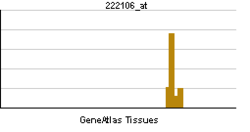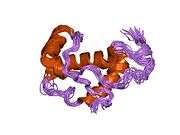PRND
This article is about Prio Protein 2 (dublet). For "Parking Reverse Neutral Drive", see Automatic transmission.
| PRND | |||||||||||||||||
|---|---|---|---|---|---|---|---|---|---|---|---|---|---|---|---|---|---|
 |
|||||||||||||||||
| |||||||||||||||||
| Identifiers | |||||||||||||||||
| Aliases | PRND, DOPPEL, DPL, PrPLP, dJ1068H6.4, prion protein 2 (dublet) | ||||||||||||||||
| External IDs | MGI: 1346999 HomoloGene: 8236 GeneCards: PRND | ||||||||||||||||
| |||||||||||||||||
| RNA expression pattern | |||||||||||||||||
 | |||||||||||||||||
| More reference expression data | |||||||||||||||||
| Orthologs | |||||||||||||||||
| Species | Human | Mouse | |||||||||||||||
| Entrez | |||||||||||||||||
| Ensembl | |||||||||||||||||
| UniProt | |||||||||||||||||
| RefSeq (mRNA) | |||||||||||||||||
| RefSeq (protein) | |||||||||||||||||
| Location (UCSC) | Chr 20: 4.72 – 4.73 Mb | Chr 2: 131.95 – 131.96 Mb | |||||||||||||||
| PubMed search | [1] | [2] | |||||||||||||||
| Wikidata | |||||||||||||||||
| View/Edit Human | View/Edit Mouse |
Prion protein 2 (dublet), also known as PRND, or Doppel protein, is a protein which in humans is encoded by the PRND gene.[3]
Function
This gene is found on chromosome 20, approximately 20 kbp downstream of the gene encoding cellular prion protein, to which it is biochemically and structurally similar. The protein encoded by this gene is a membrane glycosylphosphatidylinositol-anchored glycoprotein that is found predominantly in testis. Mutations in this gene may lead to neurological disorders.[3]
References
Further reading
- Moore RC, Lee IY, Silverman GL, et al. (1999). "Ataxia in prion protein (PrP)-deficient mice is associated with upregulation of the novel PrP-like protein doppel.". J. Mol. Biol. 292 (4): 797–817. doi:10.1006/jmbi.1999.3108. PMID 10525406.
- Weissmann C, Aguzzi A (1999). "Perspectives: neurobiology. PrP's double causes trouble.". Science. 286 (5441): 914–5. doi:10.1126/science.286.5441.914. PMID 10577243.
- Peoc'h K, Guérin C, Brandel JP, et al. (2000). "First report of polymorphisms in the prion-like protein gene (PRND): implications for human prion diseases.". Neurosci. Lett. 286 (2): 144–8. doi:10.1016/S0304-3940(00)01100-9. PMID 10825657.
- Lu K, Wang W, Xie Z, et al. (2000). "Expression and structural characterization of the recombinant human doppel protein.". Biochemistry. 39 (44): 13575–83. doi:10.1021/bi001523m. PMID 11063595.
- Schröder B, Franz B, Hempfling P, et al. (2001). "Polymorphisms within the prion-like protein gene (Prnd) and their implications in human prion diseases, Alzheimer's disease and other neurological disorders.". Hum. Genet. 109 (3): 319–25. doi:10.1007/s004390100591. PMID 11702213.
- Moore RC, Mastrangelo P, Bouzamondo E, et al. (2002). "Doppel-induced cerebellar degeneration in transgenic mice.". Proc. Natl. Acad. Sci. U.S.A. 98 (26): 15288–93. doi:10.1073/pnas.251550798. PMC 65022
 . PMID 11734625.
. PMID 11734625. - Deloukas P, Matthews LH, Ashurst J, et al. (2002). "The DNA sequence and comparative analysis of human chromosome 20.". Nature. 414 (6866): 865–71. doi:10.1038/414865a. PMID 11780052.
- Peoc'h K, Serres C, Frobert Y, et al. (2003). "The human "prion-like" protein Doppel is expressed in both Sertoli cells and spermatozoa.". J. Biol. Chem. 277 (45): 43071–8. doi:10.1074/jbc.M206357200. PMID 12200435.
- Infante J, Llorca J, Rodero L, et al. (2003). "Polymorphism at codon 174 of the prion-like protein gene is not associated with sporadic Alzheimer's disease.". Neurosci. Lett. 332 (3): 213–5. doi:10.1016/S0304-3940(02)00941-2. PMID 12399017.
- Strausberg RL, Feingold EA, Grouse LH, et al. (2003). "Generation and initial analysis of more than 15,000 full-length human and mouse cDNA sequences.". Proc. Natl. Acad. Sci. U.S.A. 99 (26): 16899–903. doi:10.1073/pnas.242603899. PMC 139241
 . PMID 12477932.
. PMID 12477932. - Makrinou E, Collinge J, Antoniou M (2003). "Genomic characterization of the human prion protein (PrP) gene locus.". Mamm. Genome. 13 (12): 696–703. doi:10.1007/s00335-002-3043-0. PMID 12514748.
- Peoc'h K, Volland H, De Gassart A, et al. (2003). "Prion-like protein Doppel expression is not modified in scrapie-infected cells and in the brains of patients with Creutzfeldt–Jakob disease.". FEBS Lett. 536 (1–3): 61–5. doi:10.1016/S0014-5793(03)00012-7. PMID 12586339.
- Lührs T, Riek R, Güntert P, Wüthrich K (2003). "NMR structure of the human doppel protein". J. Mol. Biol. 326 (5): 1549–57. doi:10.1016/S0022-2836(02)01471-7. PMID 12595265.
- Clark HF, Gurney AL, Abaya E, et al. (2003). "The secreted protein discovery initiative (SPDI), a large-scale effort to identify novel human secreted and transmembrane proteins: a bioinformatics assessment". Genome Res. 13 (10): 2265–70. doi:10.1101/gr.1293003. PMC 403697
 . PMID 12975309.
. PMID 12975309. - Hundt C, Weiss S (2004). "The prion-like protein Doppel fails to interact with itself, the prion protein and the 37 kDa/67 kDa laminin receptor in the yeast two-hybrid system". Biochim. Biophys. Acta. 1689 (1): 1–5. doi:10.1016/j.bbadis.2004.02.003. PMID 15158907.
- Massimino ML, Ballarin C, Bertoli A, et al. (2005). "Human Doppel and prion protein share common membrane microdomains and internalization pathways". Int. J. Biochem. Cell Biol. 36 (10): 2016–31. doi:10.1016/j.biocel.2004.03.002. PMID 15203115.
- Yin SM, Sy MS, Yang HY, Tien P (2004). "Interaction of Doppel with the full-length laminin receptor precursor protein". Arch. Biochem. Biophys. 428 (2): 165–9. doi:10.1016/j.abb.2004.06.003. PMID 15246873.
- Gerhard DS, Wagner L, Feingold EA, et al. (2004). "The status, quality, and expansion of the NIH full-length cDNA project: the Mammalian Gene Collection (MGC)". Genome Res. 14 (10B): 2121–7. doi:10.1101/gr.2596504. PMC 528928
 . PMID 15489334.
. PMID 15489334. - Serres C, Peoc'h K, Courtot AM, et al. (2006). "Spatio-developmental distribution of the prion-like protein doppel in Mammalian testis: a comparative analysis focusing on its presence in the acrosome of spermatids". Biol. Reprod. 74 (5): 816–23. doi:10.1095/biolreprod.105.047829. PMID 16421231.
- Azzalin A, Del Vecchio I, Ferretti L, Comincini S (2007). "The prion-like protein Doppel (Dpl) interacts with the human receptor for activated C-kinase 1 (RACK1) protein". Anticancer Res. 26 (6B): 4539–47. PMID 17201176.
This article is issued from Wikipedia - version of the 9/18/2016. The text is available under the Creative Commons Attribution/Share Alike but additional terms may apply for the media files.
